| Listing 1 - 7 of 7 |
Sort by
|
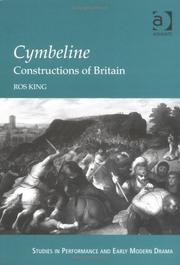
ISBN: 075460974X Year: 2005 Publisher: Aldershot : Ashgate,
Abstract | Keywords | Export | Availability | Bookmark
 Loading...
Loading...Choose an application
- Reference Manager
- EndNote
- RefWorks (Direct export to RefWorks)
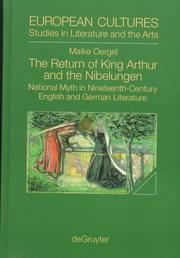
ISBN: 3110150840 9783110150841 3110812541 Year: 1998 Volume: v. 10 Publisher: New York Walter de Gruyter
Abstract | Keywords | Export | Availability | Bookmark
 Loading...
Loading...Choose an application
- Reference Manager
- EndNote
- RefWorks (Direct export to RefWorks)
Arthurian romances --- Britons in literature. --- Comparative literature --- English literature --- German literature --- Medievalism --- Middle Ages in literature. --- Mythology, Germanic, in literature. --- Nibelungen in literature. --- Adaptations --- History and criticism. --- English and German. --- German and English. --- History and criticism --- History --- Civilization, Medieval --- Middle Ages --- Young Germany --- Romances
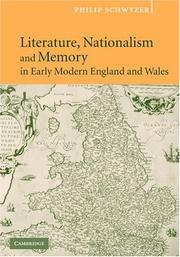
ISBN: 9780521125420 9780521843034 9780511483950 0511231458 9780511231452 0511229062 9780511229060 0511229909 9780511229909 0521843030 0511483953 1280703288 9781280703287 0521843030 1107163579 9781107163577 0511230680 9780511230684 0511316674 9780511316678 0521125421 Year: 2004 Publisher: Cambridge, UK New York Cambridge University Press
Abstract | Keywords | Export | Availability | Bookmark
 Loading...
Loading...Choose an application
- Reference Manager
- EndNote
- RefWorks (Direct export to RefWorks)
The Tudor era has long been associated with the rise of nationalism in England, yet nationalist writing in this period often involved the denigration and outright denial of Englishness. Philip Schwyzer argues that the ancient, insular, and imperial nation imagined in the works of writers such as Shakespeare and Spenser was not England, but Britain. Disclaiming their Anglo-Saxon ancestry, the English sought their origins in a nostalgic vision of British antiquity. Focusing on texts including The Faerie Queene, English and Welsh antiquarian works, The Mirror for Magistrates, Henry V and King Lear, Schwyzer charts the genesis, development and disintegration of British nationalism in the sixteenth and early seventeenth centuries. An important contribution to the expanding scholarship on early modern Britishness, this study gives detailed attention to Welsh texts and traditions, arguing that Welsh sources crucially influenced the development of English literature and identity.
Thematology --- English literature --- anno 1500-1599 --- anno 1600-1699 --- Nationalism and literature --- Literature and history --- National characteristics, British, in literature. --- National characteristics, Welsh, in literature. --- Nationalism in literature. --- Britons in literature. --- Memory in literature. --- Memory as a theme in literature --- Literature and nationalism --- Literature --- History and criticism. --- History --- Wales --- In literature. --- Arts and Humanities
Book
ISBN: 9783110812541 3110812541 Year: 1998 Publisher: Berlin : Walter de Gruyter,
Abstract | Keywords | Export | Availability | Bookmark
 Loading...
Loading...Choose an application
- Reference Manager
- EndNote
- RefWorks (Direct export to RefWorks)
English literature --- Arthurian romances --- German literature --- Comparative literature --- Comparative literature --- Mythology, Germanic, in literature. --- Medievalism --- Middle Ages in literature. --- Nibelungen in literature. --- Britons in literature. --- History and criticism. --- Adaptations --- History and criticism. --- History and criticism. --- English and German. --- German and English. --- History
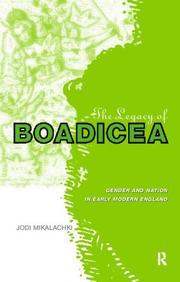
ISBN: 0415182646 Year: 1998 Publisher: London New York Routledge
Abstract | Keywords | Export | Availability | Bookmark
 Loading...
Loading...Choose an application
- Reference Manager
- EndNote
- RefWorks (Direct export to RefWorks)
Ancient history in literature --- Bretoenen uit Groot-Brittannië in de literatuur --- Bretons de Grande-Bretagne dans la littérature --- British national characteristics in literature --- Britons in literature --- Brits volkskarakter in de literatuur --- Britse volksaard in de literatuur --- Caractéristiques nationales britanniques dans la littérature --- Geschiedenis van de oudheid in de literatuur --- Histoire de l'antiquite dans la litterature --- History [Ancient ] in literature --- National characteristics [British ] in literature --- Volksaard [Britse ] in de literatuur --- Volkskarakter [Brits ] in de literatuur --- Women soldiers in literature --- Britons in literature. --- English literature --- History, Ancient, in literature. --- National characteristics, British, in literature. --- Women and literature --- Women soldiers in literature. --- History and criticism. --- History --- History and criticism --- Early modern, 1500-1700 --- Boadicea, Queen --- Influence --- Great Britain --- Roman period, 55 B.C.-449 A.D. --- Historiography --- Shakespeare, William --- England
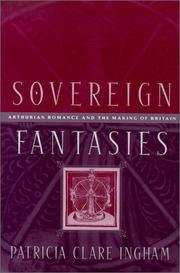
ISBN: 0812236009 0812292545 Year: 2001 Publisher: Philadelphia : University of Pennsylvania Press,
Abstract | Keywords | Export | Availability | Bookmark
 Loading...
Loading...Choose an application
- Reference Manager
- EndNote
- RefWorks (Direct export to RefWorks)
English literature --- Arthurian romances --- Literature and history --- National characteristics, British, in literature. --- Romances, English --- Kings and rulers in literature. --- Britons in literature. --- Littérature anglaise --- Cycle d'Arthur --- Littérature et histoire --- Caractéristiques nationales britanniques dans la littérature --- Roman courtois anglais --- Rois et souverains dans la littérature --- Bretons de Grande-Bretagne dans la littérature --- History and criticism. --- History --- Histoire et critique --- Histoire --- Historical fiction, English
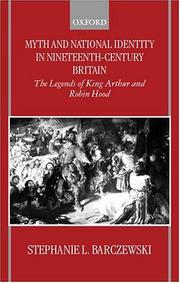
ISBN: 019820728X 0191677612 0191542733 1280445351 Year: 2000 Publisher: Oxford Oxford University Press
Abstract | Keywords | Export | Availability | Bookmark
 Loading...
Loading...Choose an application
- Reference Manager
- EndNote
- RefWorks (Direct export to RefWorks)
Scholars continue to find that fictional narratives provide rich insight into the historical development of a modern national consciousness. In nineteenth-century Britain, the legends of King Arthur and Robin Hood played an important role in construction of contemporary national identity. These two legends provide important windows on British culture and draw from very different perspectives. King Arthur and Robin Hood have traditionally been diametrically opposed in their ideological orientation, with Arthur at the pinnacle of the social and political hierarchy and Robin Hood completely outside conventional hierarchical structures. The fact that two such different figures could simultaneously function as British national heroes suggests that nineteenth-century British nationalism did not represent a single set of values and ideas, but rather that it was forced to assimilate a variety of competing points of view.
English literature --- Thematology --- Robin Hood --- Arthur [King] --- anno 1800-1899 --- Nationalism and literature --- Arthurian romances --- National characteristics, British, in literature. --- Medievalism --- Robin Hood (Legendary character) in literature. --- Nationalism in literature. --- Britons in literature. --- Outlaws in literature. --- Myth in literature. --- Littérature anglaise --- Nationalisme et littérature --- Roman arthurien --- Caractéristiques nationales britanniques dans la littérature --- Médiévisme --- Robin des bois (Personnage légendaire) dans la littérature --- Nationalisme dans la littérature --- Bretons de Grande-Bretagne dans la littérature --- Hors-la-loi dans la littérature --- Mythe dans la littérature --- History and criticism. --- History --- Adaptations --- Histoire et critique --- Histoire --- Adaptation --- Arthur, --- In literature. --- Great Britain --- Grande-Bretagne --- Civilization --- Civilisation --- Littérature anglaise --- Nationalisme et littérature --- Caractéristiques nationales britanniques dans la littérature --- Médiévisme --- Robin des bois (Personnage légendaire) dans la littérature --- Nationalisme dans la littérature --- Bretons de Grande-Bretagne dans la littérature --- Hors-la-loi dans la littérature --- Mythe dans la littérature --- King Arthur [Fictitious character] --- Robin Hood [Fictitious character] --- KING ARTHUR --- ROBIN HOOD (LEGENDARY CHARACTER) --- ENGLISH LITERATURE --- 19th CENTURY
| Listing 1 - 7 of 7 |
Sort by
|

 Search
Search Feedback
Feedback About UniCat
About UniCat  Help
Help News
News